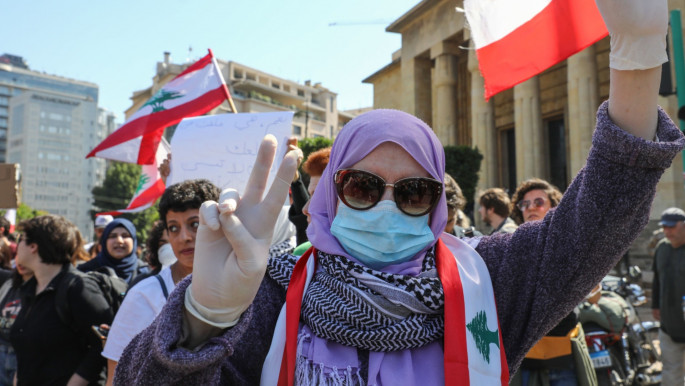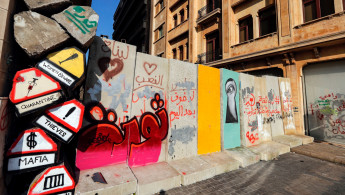Besides coronavirus, Lebanon has an equally dangerous outbreak on its hands - unemployment
Khadduj set his vehicle on fire on the side of the road, before bystanders and security forces stopped him from doing the same to himself.
Lebanon on 15 March announced a state of "general mobilisation", where most private and public institutions shuttered, and people were told to stay home unless it was absolutely necessary to do otherwise.
The country's one international airport and land and sea borders were closed too. Security forces and the military were dispersed across the country to make sure people were staying in.
On 26 March, Prime Minister Hassan Diab's Cabinet announced that these measures continue for another two weeks – now with a curfew between 7pm and 5am.
On top of the Covid-19 outbreak, now approaching 500 confirmed cases, Lebanon is facing its worst economic crisis since its 15-year civil war decades ago.
 |
|
| Read more: Lebanon's medical students on the frontline in fighting coronavirus |
One of the most indebted countries in the world, the Lebanese government announced that it could no longer pay its foreign debts for the first time earlier this month. At the same time, Lebanon is trying to cut public spending to unlock around $11.1 billion in loans the international community conditionally pledged almost two years ago.
Unemployment surges
That being said, the unemployment rate in Lebanon is nowhere near crystal clear, with numbers differing according to different government officials and international organisations.
In fact, a 2019 report by the Labour Ministry quoted former head of the Lebanese Center for Policy Center Studies Oussama Safa. "In Lebanon there are no reliable statistics, there are good guestimates," it read. "For instance, 24-30 percent is an acceptable figure of unemployment."
The Labour Ministry did not respond to The New Arab's request when contacted.
But this was back in 2007. The Ministry of Labour in 2017 said unemployment is at around 25 percent, though then-prime minister Saad Hariri said it was 30 percent that same year. Several months later, President Michel Aoun claimed that unemployment had hit 46 percent.
 |
Lebanon's young adults continue to leave the country in droves |  |
It is expected that these numbers have skyrocketed, as Lebanon's economy continues to take a turn for the worse.
Local daily Annahar claims that unemployment is now at 40 percent, which supplements Prime Minister Diab's fears of "over 40 percent" of Lebanon's residents soon living under the poverty line.
Read also: Lebanon will need more than social distancing and lockdown to beat coronavirus
Lebanon's young adults continue to leave the country in droves. Twenty-four-year-old communications worker Tala told The New Arab that her friends will try to leave the country as soon as they graduate from university. Like many other Lebanese, work has slowed down significantly.
"In the past year, I've seen many friends…escape to Europe to do their masters or move abroad for a better position and pay," she said. "Almost everyone I know…tries to convince me it's the better option."
Calls for a viable social safety net
Lebanon heavily relies on private sector and non-governmental organisation (NGO) alternatives, as well as patronage networks from political parties, to counter the state's shortcomings in providing services.
 |
|
| Read more: Baytna Baytak: Heart-warming initiative houses Lebanon's healthcare workers for free |
But in light of the economy's further decline, more Lebanese are asking the state to step in.
Tony Ramy, who heads Lebanon's syndicate for restaurant owners, urged the Lebanese government to follow suit of its regional neighbours, namely Qatar, Jordan, and the United Arab Emirates, to inject cash into the country's ailing tourism sector.
In an interview this month, Ramy said that the tourism sector's losses are estimated at $500 million per month. Almost 800 restaurants and food and beverage establishments have shuttered between September 2019 and February 2020 alone.
A statement from the syndicate earlier this month said the closure of restaurants, cafes, and other establishments was crucial in light of the Covid-19 outbreak, but was a "knockout blow" to their sector.
 |
In light of the economy's further decline, more Lebanese are asking the state to step in |  |
With a surging rate of business closures, work restrictions, and job losses, it comes to no surprise that there was a renewed call for rent and utility payment exemptions.
While the Lebanese government has not responded to these calls, Information Minister Manal Abdel Samad announced on Thursday that the cabinet will be giving the Higher Relief Council 75 billion liras (about $38 million at the state-sanctioned parallel market currency rate) for social and food security relief efforts.
Read also: Lebanon hospitals 'discriminating against' undocumented workers seeking vital coronavirus testing
However, American University of Beirut professor and economist Jad Chaaban has called for what resembles a Universal Basic Income – a state-provided monthly income.
Chaaban's proposal would provide a household of up to roughly $250 per household held with a maximum of $500 for three months- subject to renewal.
 |
|
| Read more: Lebanese volunteers launch heroic effort to help health workers battle coronavirus |
This project would specifically target citizens above 18 years of age who lost their jobs after 21 February, or who had a monthly income of about $338 dollars over the past half year.
Chaaban is adamant, that this proposal would be feasible for cash-strapped Lebanon, only costing a small fraction of its budget.
Grassroots initiatives fill the gap
Meanwhile, grassroots initiatives are being set up. Mada, a countrywide network of independent student and youth groups has established an initiative to provide aid to vulnerable families and communities.
'Kitfe b Bitfak', roughly translating as 'Shoulder to Shoulder', in a just a few days had 86 committed volunteers and is cooperating with some 56 families at need.
"The fact that this pandemic is occurring in times of financial crisis would mean things are going to get worse soon," Hassan Al Horr, the project's communication coordinator told The New Arab.
 |
The government cannot simply make people stay at home without giving them any compensations, whether monetary or through other supplies -Hassan Al Horr |
 |
"The government cannot simply make people stay at home without giving them any compensations, whether monetary or through other supplies."
Al Horr told The New Arab he was blown away by the growing interest of people to sign up and volunteer. The initiative's Facebook group in parallel has become a bulletin board for people looking for jobs or sharing information about people in need.
While receiving donations from members, they have also partnered with local NGO FoodBlessed, which is dedicated to ending hunger in Lebanon.
Al Horr, just in his early 20s, is confident that grassroots initiatives like this will play a crucial role in filling the gap left by the state. He told The New Arab he's dedicated to volunteering with this project, feeling he's one of the more fortunate people in his circles in the middle of Lebanon's crisis.
"I graduated last year and luckily found a job."
Follow him on Twitter: @chehayebk



